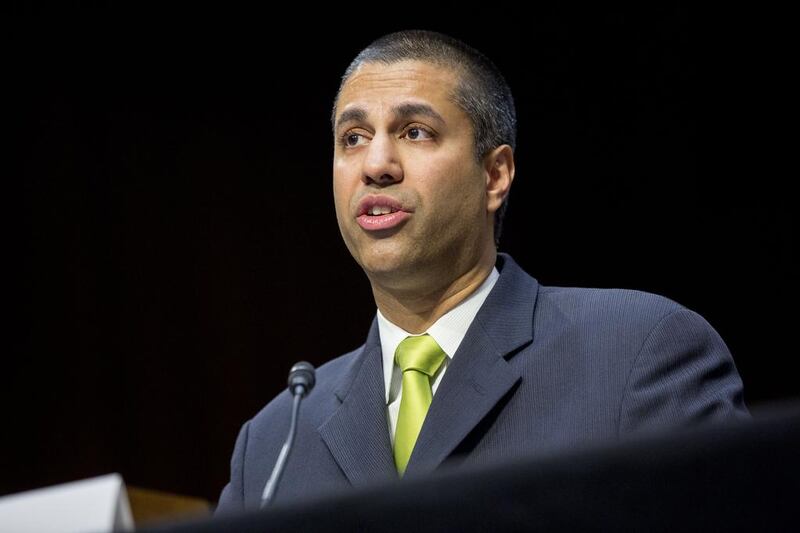upcoming fight over net neutrality in the United States may seem like a purely American battle, but it’s a globally important event that bears watching around the world.
At stake is the future of large parts of the existing internet, as well as those that have yet to be formed or even thought of. It sounds hyperbolic, but it isn’t – American policymakers may soon determine whether unfettered innovation on the internet gets to continue or whether the brakes get slammed on.
The showdown will centre on Ajit Pai, the head of the US Federal Communications Commission (FCC). Appointed in January to lead the telecommunications regulator by the president Donald Trump, Mr Pai has made no bones about his intentions to scrap net neutrality protections brought in by the previous administration.
Under Democrat chairman Tom Wheeler, the FCC in 2015 enacted new rules that classified US internet providers as common carriers, which put them under the telecom regulator’s auspices. Telecom companies including Verizon challenged the change in court and lost.
As a result, the FCC does not currently allow undue traffic interference such as paid prioritisation, which is where an internet provider could allow an online company such as Netflix to transmit its data to subscribers faster in exchange for an extra fee. The rules are intended to keep all internet players, big and small, on equal footing.
Before Mr Pai took the reins, the FCC was also investigating whether zero rating – where mobile carriers exempt certain applications from users’ monthly data caps – should be allowed.
Regulators around the world are watching their respective carriers as they experiment with this relatively new practice, to see if it is indeed harmful.
In the UAE, for example, du offers unlimited downloading of the music service Anghami while some Etisalat plans do not count certain social media apps against caps. Such arrangements could be making it tougher for competitors to those services to gain traction with consumers.
Mr Pai quickly killed off the FCC’s zero-rating review and has repeatedly stated he wants to reverse the common carriers’ reclassification. He is expected to officially announce his plan as early as next month, according to The Wall Street Journal.
The new chairman instead believes the open market will keep ISPs and wireless carriers honest – that competition will prevent them from engaging in anti-consumer activities that could also be harmful to online innovation. Failing that, they could always be disciplined through existing anti-competition rules already overseen by the US Federal Trade Commission.
The problem with that line of thinking, as consumer advocates point out, is that there isn’t much competition in telecom services, especially when it comes to home internet. Mr Wheeler noted in a 2014 speech that an overwhelming three-quarters of Americans had “no competitive choice for the essential infrastructure for 21st-century economics and democracy”.
Joining consumer advocates in opposing Mr Pai’s plan is The Internet Association, a group of three dozen technology companies including Google, Netflix and Facebook. The group met the FCC chairman last week to stress their belief that the rules ushered in by his predecessor should be kept.
The rationale behind their stance isn’t immediately obvious, since many members would stand to benefit from a reversion of the rules.
Google, Netflix and the rest are, after all, in positions where they could afford to pay internet providers for faster traffic and thereby give themselves advantages over newer fledging competitors.
But the companies are wisely looking at the longer-term picture instead.
Giving telecom providers the ability to shape and manipulate traffic, free from the governing forces of competition, is bound to have negative effects for them sooner rather than later.
The battle is globally relevant because of the sheer amount of innovation investment infrastructure and dollars that are housed in the United States, not to mention the fact that the country is the largest developed market for technology.
There is an element of truth in the notion that poor US internet policy might be good for development in other countries, but the reality is that any obstacles in the US would be bad for everyone.
Like it or not, Silicon Valley is the engine that drives and inspires much of the world’s technological development.
After all, without Uber there would probably never be a Careem and without Amazon there may not have been a Souq.com.
Net neutrality safeguards in the US are thus universally important, which is why this is such a globally relevant battle that everyone, everywhere should be paying attention to.
The tech week’s winner and loser:
Winner of the Week: New Zealand
The country has long wanted to become a hub of tech development, but its isolated location has so far hurt its efforts. That fact is now being flipped, as tech workers seeking to escape unfriendly political environments elsewhere overwhelmed a recent recruitment programme.
Loser of the Week: Facebook.
An American man used Facebook Live this week to broadcast a murder and then his own suicide. Along with the fake news epidemic, the social network now finds itself at the centre of several socially destructive controversies.
Peter Nowak is a veteran technology writer and the author of Humans 3.0: The Upgrading of the Species.
business@thenational.ae
Follow The National's Business section on Twitter





